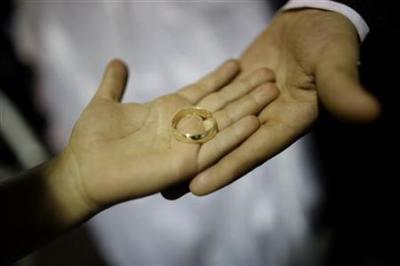Indiana Allows Humanists to Officiate Own Weddings

A federal appeals court in Indiana has ruled to allow humanists in the state to have their weddings officiated by a secular celebrant.
A three judge panel with the Chicago-based 7th U.S. Circuit Court of Appeals ruled this week that humanists should be allowed to have their weddings officiated by secularist celebrants, arguing that preventing them from doing so violated the First Amendment rights to freedom of religion. Previously, Indiana's law stated that marriages could only be performed by religious clergy or government officials, such as mayors and city clerks.
"This is a big step forward in recognizing the rights of nonreligious persons," Reba Boyd Wooden, executive director for the Center for Inquiry, a humanist group, said in a press release. "Now couples may have a Secular Celebrant who shares their world view solemnize their marriage."
"The court has gotten this exactly right," Wooden, whose group was the plaintiff in the case, continued. "Whether a person is atheist, agnostic, humanist, or simply doesn't want a religious wedding, this decision means they can now have these wonderful occasions solemnized by a celebrant who shares their life-stance."
Ronald Lindsay, president of the Center for Inquiry, added that he found the judges' Monday ruling to be "deeply satisfying," saying that he believes the judges have "recognized that nonreligious Americans are entitled to the same rights as religious Americans."
The Center for Inquiry, which certifies secular celebrants, had sued the state regarding its law a few years back, although in 2012 U.S. District Judge Sara Evans Barker upheld the law. The humanist organization currently has 23 certified secular celebrants across the nation.
Indiana's Attorney General Greg Zoeller, who was defending the state law in the court case, said in a statement Monday that he and his office are currently weighing options of a possible appeal to the ruling.
"We contended the legislature's requirements for determining who can solemnize a marriage for the purpose of filing a marriage license at the county clerk's office were reasonable and included alternatives for couples without involving clergy."
Currently, three other states, including Florida, Maine, and South Carolina, allow secularist celebrants to perform weddings if they become notaries public. Monday's ruling changed Indiana's current law to also allow notaries public to officiate weddings in the state.


























